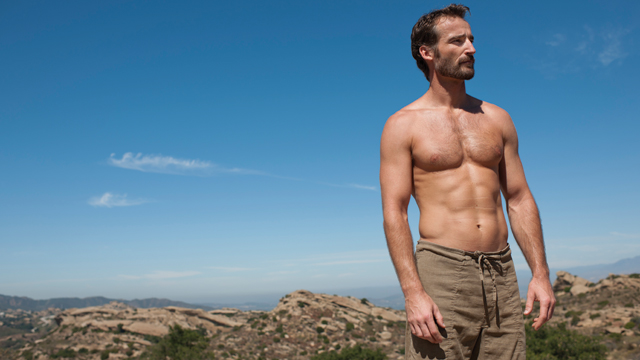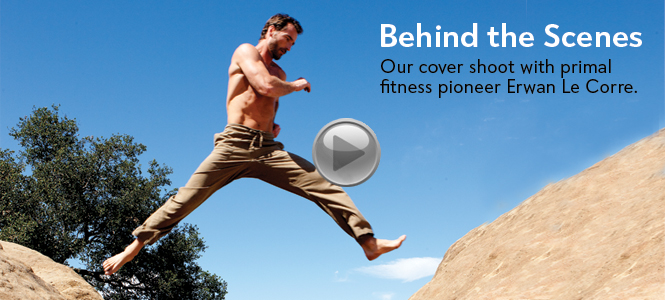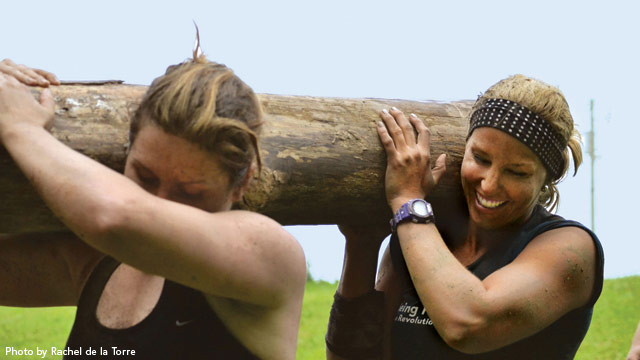EL | What is MovNat all about?
ELC | First, MovNat is a physical education system. We train people to be efficient and safe when making instinctual, evolutionary natural movements, such as walking, running, jumping, climbing and balancing. While those movements come naturally to people, being efficient and safe at them doesn’t necessarily — in part because our lifestyles are so divorced from the outdoors.
Second, MovNat is a fitness method based on that physical education system — a way to build better fitness. As we teach people to move naturally and efficiently, they become stronger, more coordinated, more fit in the process.
Finally, MovNat is a lifestyle. It’s about being fit, yes, but it is also about eating naturally and living in a way that supports our vitality. Exposure to light and nature is important. Healthy relationships are important. Creating time for yourself is important. All of these environmental influences participate in your genetic expression, and your genetic expression influences how you look, how you perform and, of course, how you feel.
EL | Why do you teach your physical education courses outdoors?
ELC | Well, very simply, nature is where we all come from. We are nature. This is not a romantic notion; this is a fact. The more divorced our lifestyles are from nature, the more we suffer. Contact with nature is inherently healing. This doesn’t mean we have to live exclusively in the wilderness and go back to huts or caves. It just means that we definitely need regular contact with nature — much, much more than most people get in today’s world.
EL | You mentioned that part of this lifestyle involves “eating naturally.” What does that mean to you?
ELC | It primarily means eating whole foods that have been grown and prepared in the most basic ways possible. We advocate a Paleo diet, but don’t impose it. People have totally different views on what optimal nutrition or ethical nutrition should be, and if someone wants to practice MovNat but, at the same time, be vegan — well, it’s totally up to them. We totally respect their choice, and their ethics.
EL | What drew you to this type of movement and this way of living?
ELC | When I was a child in France, my parents would take us for long hikes every Saturday and Sunday. We lived by the woods and it was a natural playground for us. Moving in nature, in the woods, always made me feel good, while spending too much time in artificial environments did not.
EL | What do you see as the most important benefits of exercising in complex outdoor environments?
ELC | One benefit is that you develop adaptability — and adaptability is the real measure of capability. For example, if you can run on a treadmill, you have some running capability. Now, if I remove the treadmill and you run through the woods, there will be holes, hills, mud, stones and fallen trees. If you always run on a treadmill, you probably won’t be able to adapt easily to all of that. What does that tell you about the real state of your running capability?
Another benefit is greater brain function. The more complex the movement, and the more complex the environment your movement must adapt to, the greater the challenge for your brain. That challenge boosts neurogenesis, which is the production of new brain cells. Neurogenesis keeps your brain healthier, more functional, younger.
Also, when your brain is focused on adapting to the environment, you cannot afford to be mindless. You must reengage the mind with the body. You become immersed in the here and now, the present moment, and that’s when the fun starts.
EL | What role does community play in your training methodology?
ELC | When people train in MovNat, they connect with other people who are seeking the same kind of change and the same kind of results. That creates a community. Ours is a community where people collaborate rather than compete. We encourage each other. We support each other. We watch each other.
This has some very practical implications. For instance, if you have to carry something heavy and you can’t carry it yourself, you will need several people to cooperate and communicate and synchronize the effort so that you can achieve it together. This is the real meaning of training together. And it is extremely powerful in terms of group-building, or we could even say tribe-building.
More generally, community is what makes us human. To be part of the community, to participate in community, to benefit and help the community — this is essential for any human group on the planet.
Anyone who says, “I’m a self-made man” or “a self-made woman” is delusional. Human beings have been able to survive and thrive and expand because of our ability to cooperate and support each other in order to achieve things that a single individual could not do. And new technologies aren’t a substitute. People can use Facebook and Twitter and other social media and can still be really isolated and not have healthy relationships.
EL | What influence do you think new technologies and modern conveniences are having on us as a culture?
ELC | New technologies are not necessarily bad. They can be very useful. They make our lives more comfortable. The problem is that the way we use technologies is not necessarily balanced and wise. When we constantly want to be comfortable and don’t want to make any effort anymore, that’s when we’re in trouble. Our nature is to be very adaptive and to move, and when we’re too comfortable, our needs for movement, for light, for sleep, for contact with nature, for healthy relationships with people — these needs tend to get overlooked.
EL | What does “fitness” mean to you?
ELC | Fitness, in my mind, is less about what our bodies look like than what they can do. Take the idea of a “beach ready” body. Are you able, if you see someone drowning, to dive in the water and swim fast? Can you hold your breath, dive and pull someone up to the surface, and then swim, making sure that his head is out of the water? At the shore, can you lift and carry this person to safety? When you can do that, you’re beach ready. If you work out and have big arms and flat abs and a firm butt, cool. But fitness is about more than that.



This Post Has 0 Comments